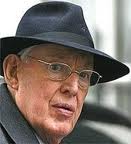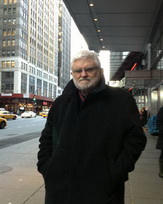The
death of Ian Paisley was announced last Friday, may he rest in peace.
A
political figure who dominated the thirty year period often referred to as The
Troubles in Northern Irish history,
Paisley
was always a divisive figure; you were either for or against him. Many saw him
as the pivotal influence during that time of conflict. Essential a street
politician, with a strong physical presence and a strident voice, he was also a
preacher whose Protestant faith took expression in an anti-Catholic stance that
brooked no argument. I first came across him during a televised broadcast of a
debate at the Oxford Union, in I believe 1967 or 68. He was in debate with
Norman St. John Stevas, a Catholic MP on beliefs in Catholic faith. At one point
he produced a large altar bread and made the gesture of raising it after
consecration to the general disapproval of the House. It indicated his
willingness to move to the extreme edge in opposition to the Church, regardless
of sensitivities. Twenty years later, in October 1988, he was evicted from the
European Parliament when he interrupted John Paul II, calling him the
anti-Christ as the Pope began to address the Assembly.
That
televised debate in 68 was just before the date that is often defined as the
start of the Troubles, the Derry Civil Rights marches, in 1969.
From
here on in, his was the voice of opposition to the nationalist voice, his
standard the rallying point for vociferous argument that was to become violent
confrontation between Loyalists and Nationalists, between the UDA/UDF and the
IRA. During those painful years of the 70s and 80s, many lives were lost in both
communities in a seemingly unstoppable spiral of opposition from entrenched
opinions. The bullet and bomb became the currency of community debate. As for
discussion with the nationalists, his voice continued to raise his constant
clarion call, “No, never!”
With
a significant effort in the 90s, the involvement of President Clinton, John
Major, the UK Prime Minister and the late Albert Reynolds, Tony Blair who became
prime minister after Major and Bertie Ahern who succeeded Reynolds as the Irish Taoiseach, with Gerry Adams and Martin McGuiness of Sinn Fein, we moved
towards the Good Friday agreement, a few hesitant steps at a time.
Who
would have thought at that stage, after so many years of political opposition
that Ian Paisley, the advocate of Unionism and Martin McGuiness, from the
Nationalist community seeking a United Ireland, would later have been at the
head of a power-sharing administration at Stormont? Over subsequent years, they
not only worked together but formed a personal friendship.
Saturday’s
obituary in the New York Times noted that “On the
day of his swearing-in as first minister in
Belfast
, a thriving city that had once been an armed fortress, Mr. Paisley was solemn.
“While this is a sad day for all the innocent victims of the Troubles, yet it
is a special day because we are making a new beginning,” he said. “I believe
we are starting on a road to bring us back to peace and prosperity.”
On his retirement, McGuiness presented Paisley with a framed quotation from
Seamus Heaney, hand written by the poet taken from the Cure at
Troy
.
History
says don't hope on this side of the grave,
But
then, once in a lifetime
The
longed-for tidal wave
Of
justice can rise up.
And
hope and history rhyme.
Those
words were spoken by Bill Clinton in
Derry
in 1995 and have often been quoted since.
When
in 2007 Tony Blair had made his decision to become a Catholic, he advised
Paisley
of his intentions in a private exchange. The response he received consisted of
four words “You are a fool”
At
the age of 88, his life is concluded, a life of significance, of turmoil, of
contrasts and ultimately of a working reconciliation of diametrically opposite
views, seeking a way forward that puts violence aside.
However,
former Alliance Party leader John Cushnahan, quoted on the BBC News website,
said that while he sympathised with the family, he was astonished at the
"rewriting" of Ian Paisley's political contribution.
"While
I welcome the fact that he ultimately embraced power sharing, it was too little
too late and should not be used to excuse the pain and suffering that he
inflicted on the people of Northern Ireland for the majority of his political
life,"
Maybe
we have to await the distance of historical perspective to determine the full
effect of Ian Paisley’s contribution to these painful years in Northern Ireland. Both the long term success in political pragmatism of the Good Friday
agreement and the progression of an ecumenical dimension between the Christian
communities, will ultimately offer an answer.
END
---------------

